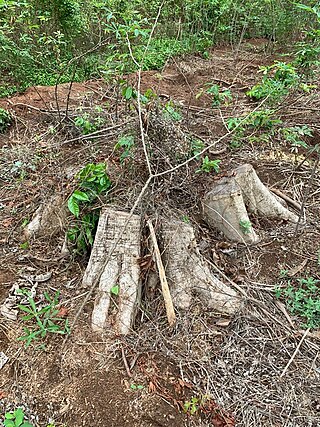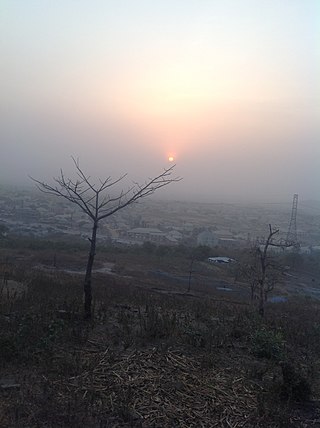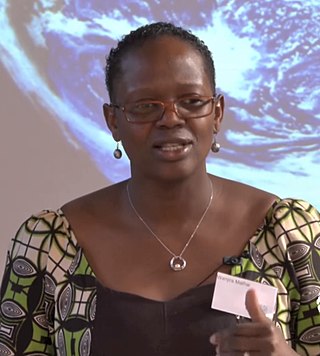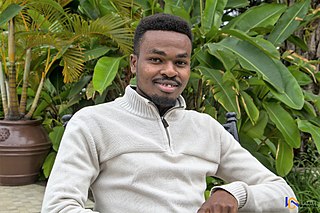
Earth Day is an annual event on April 22 to demonstrate support for environmental protection. First held on April 22, 1970, it now includes a wide range of events coordinated globally by EARTHDAY.ORG including 1 billion people in more than 193 countries. The official theme for 2024 is "Planet vs. Plastics." 2025 will be the 55th anniversary of Earth Day.
The Green Belt Movement (GBM) is an indigenous grassroots organization in Kenya that empowers women through the planting of trees. It is one of the most effective and well-known grassroots organisations addressing the problem of global deforestation. Professor Wangari Maathai established the organization in 1977 under the auspices of the National Council of Women of Kenya (NCWK). GBM's successes in forest conservation, education, and women's economic empowerment have gained the organisation worldwide acclaim. It is also noted for its advocacy of human rights, democratisation of access to public lands, and environmental justice issues such as the role of women's traditional ecological knowledge in addressing environmental degradation and desertification.
Environmental issues in Pakistan include air pollution, water pollution, noise pollution, climate change, pesticide misuse, soil erosion, natural disasters, desertification and flooding. According to the 2020 edition of the environmental performance index (EPI) ranking released by Yale Center for Environmental Law & Policy, Pakistan ranks 142 with an EPI score of 33.1, an increase of 6.1 over a 10-year period. It ranked 180 in terms of air quality. The climatic changes and global warming are the most alarming issues risking millions of lives across the country. The major reasons of these environmental issues are carbon emissions, population explosion, and deforestation.
This article includes information about environmental groups and resourcesthat serve K–12 schools in the United States and internationally. The entries in this article are for broad-scope organizations that serve at least one state or similar regions.

Deforestation in Nigeria refers to the extensive and rapid clearing of forests within the borders of Nigeria. This environmental issue has significant impacts on both local and global scales.

Kubwa is a residential district in Bwari, one of the local government areas in the Federal Capital Territory in Nigeria. It is one of the major suburbs within the metropolitan area of Abuja.
Aytzim, formerly the Green Zionist Alliance (GZA), is a New York–based Jewish environmental organization that is a U.S.-registered 501(c)(3) tax-deductible nonprofit charity. A grassroots all-volunteer organization, Aytzim is active in the United States, Canada and Israel. The organization is a former member of the American Zionist Movement and has worked in partnership with Ameinu, the Coalition on the Environment and Jewish Life (COEJL), Hazon, Interfaith Moral Action on Climate, Interfaith Oceans, GreenFaith, Mercaz/Masorti, the National Religious Coalition on Creation Care, and the Jewish National Fund (JNF)—although Aytzim has long criticized JNF for not prioritizing sustainability and environmental justice in its actions. Aytzim's work at the nexus of Judaism, environmentalism and Zionism has courted controversy from both Jewish and non-Jewish groups.

Bilikiss Adebiyi or Bilikiss Adebiyi-Abiola is a Nigerian entrepreneur who founded the Lagos-based recycling company 'Wecyclers'. She is currently the Director General of the Lagos State Records and Archives Bureau (LASRAB) and Managing Director of the Lagos State Parks and Gardens Agency (LASPARK). She is also a member of the Board of Trustees of the Lagos State Employment Trust Fund.
Adenike Adebukola Akinsemolu is a Nigerian sustainability advocate, educator, author, and a social entrepreneur. She is a lecturer at Obafemi Awolowo University. She is known as one of the country's leading experts on environmental sustainability.

Wanjira Mathai is a Kenyan environmentalist and activist. She is Managing Director for Africa and Global Partnerships at the World Resources Institute, based in Nairobi, Kenya. In this role, she takes on global issues including deforestation and energy access. She was selected as one of the 100 Most Influential Africans by New African magazine in 2018 for her role serving as the senior advisor at the World Resources Institute, as well as for her campaign to plant more than 30 million trees through her work at the Green Belt Movement.
Titilope Gbemisola Akosa, popularly known as Titilope Akosa, is a Nigerian environmentalist, climate justice advocate, lawyer, gender and social inclusive expert, and human rights activist. She is the founder and executive director for the non-governmental sustainability organization Centre for 21st Century Issues (C21st). She heads the law firm Titi Akosa & Co Nigeria. In 2015, she was the spokesperson for women and gender non-governmental organizations at the 2015 Paris Climate Treaty on the topic 'Towards a Gender Responsive Green climate fund in Africa'.

Sustainable Development Goals and Nigeria is about how Nigeria is implementing the Sustainable Development Goals within the thirty-six states and its Federal Capital Territory (FCT). The Sustainable Development Goals (SDGs) consist of seventeen global goals designed as a "blueprint to achieve a better and more sustainable future for all". Each of the 17 goals is expected to be achieved by 2030 in every country around the world.

Kaluki Paul Mutuku is a Kenyan climate activist and environmentalist, working to improve youth participation in decision-making around climate justice. He is the co-founder of Kenya Environmental Activists Network (KEAN); KEAN is a NGO that provides a platform that will bring together environmental activists. His center of attention for Africa lies around environmental rejuvenation, afforestation, organic farming and youth leadership across boards.

Headquartered in Morocco, the High Atlas Foundation (HAF) is a nonprofit organization that promotes community-designed initiatives for sustainable agriculture, women’s and youth empowerment, education, health, and capacity-building in Morocco.
Nigeria Youth SDGs Network which is registered as the Network of Youth for Sustainable Initiative is a youth led and youth serving civil society organization localizing the United Nations Sustainable Development Goals launched in April 2017.

Olumide Idowu, is a Nigerian youth campaigner and climate change activist. He is the co-founder of the International Climate Change Development Initiative, Climate Wednesday and Nigerian Youth Climate Coalition. Olumide was an Atlas Corps fellow, State International Visitor Leadership Program (IVLP) alumni, social media and communications officer for Association for the Development of Education in Africa, Triennale 2017 in Senegal, and the senior communication director for African Youth Initiative on Climate Change (AYICC). He was the Organizing Committee Member for 7th Global Platform on Disaster Risk Reduction (DRR) in Mexico, African Youth Champion for the United Nations International Strategy for Disaster Reduction (UNISDR) and he received the 2015 Save the Children Award for his Contribution towards Sustainable Development in Nigeria.

Ghana Youth Environmental Movement (GYEM), is a national youth-led environmental group in Ghana established in 2012, by a group of young activists led by Gideon Commey, that empowers young people to engage in a sustainable environment and address climate issues through advocacy campaigns and community activities.
Temilade Salami known as Global Temi is a Nigerian environmentalist, a circular economy enthusiast, a marine biologist and an author. She was born on the 10th of June Temilade Salami serves as the Executive Director of EcoChampions a prominent network of environmental professionals in Nigeria, leading change through tree planting, ocean conservation advocacy, plastic waste management, and environmental education across the nation.









